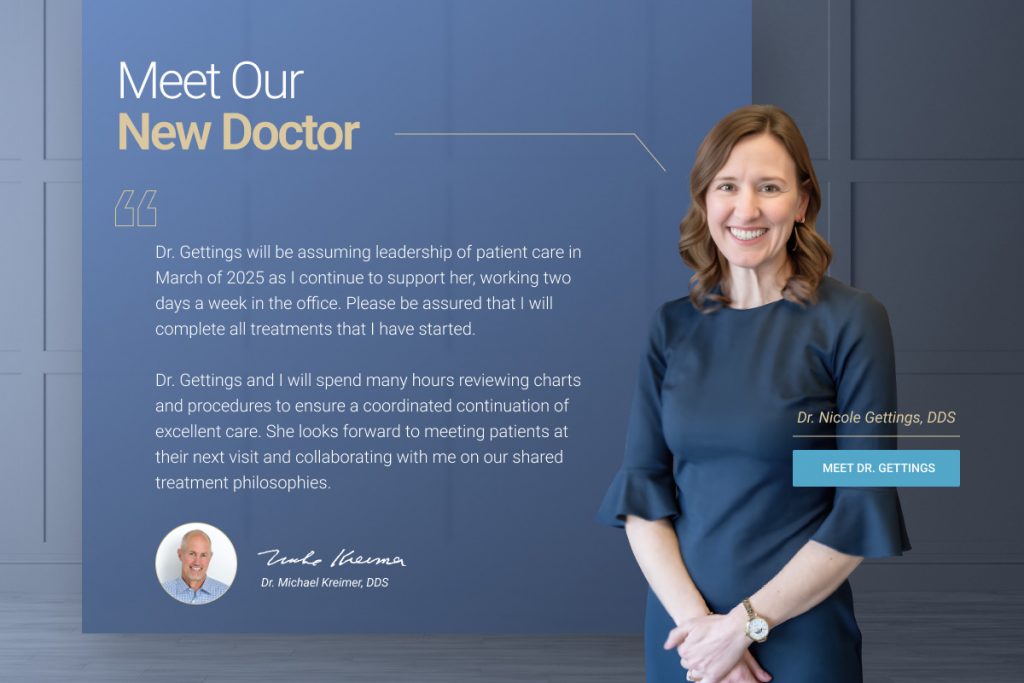Oral Health Explained By Dr. Kreimer
Like the foundation for your house, healthy gums are integral to the strength of your teeth. Not many people know healthy gums provide the support needed for your teeth to function. Unfortunately, it can be challenging to determine whether your gums are healthy. That’s why Dr. Michael Kreimer created this friendly guide to understand the importance of keeping your oral health maintained.
Signs of Healthy Gums
If you’re not sure what are the signs of healthy gums, here’s what you can look for:
- Light pink in color (darker for people with darker complexions)
- Stippled, much like the surface of an orange
- Not tender or swollen
- Don’t bleed when brushing or flossing

Gum Disease, The Silent Disease
Gum disease (periodontitis) is the leading cause of tooth loss among adults. It’s known as a silent disease because it’s rarely painful, especially in the early stages. Bleeding gums is often the first warning sign most people have of gum disease. Gum disease can kill more than just your smile!
Recent research has identified a link between gum disease and heart disease, and other health problems. If gum disease is left untreated, the bacteria can enter your bloodstream and threaten your overall health.
Gum Disease Treatments
During your initial consultation with Dr. Kreimer, he’ll evaluate your gums and teeth and take impressions and X-rays of your mouth. This information will help Dr. Kreimer determine if you’re suffering from gum disease. If there are signs of gum disease, you require gum disease treatment.
Several treatments depend on the stage of your gum disease:
- Deep Cleaning: If caught early, deep cleanings can help reverse the disease. Your dentist will provide instructions on oral hygiene habits and recommend visiting their office to ensure it doesn’t progress.
- Scaling & Root Planning: Patients can benefit from this treatment if suffering from mild to moderate gum disease. During this procedure, your dentist will remove hardened plaque and bacteria from under the gum line. Afterward, we’ll smooth out the tooth roots to prevent bacteria from settling into the area.
- Periodontal Surgery: If gum disease has reached its advanced stage or the scaling and root planing couldn’t stop the progression, surgery is necessary before it spreads even further. Surgery can help reduce pocket depths and make it easier to clean the area.
Caring for Your Gums
To ensure your gums stay healthy, visiting your dentist twice a year for prevention and early detection can help keep your gums healthy.
- Brush your teeth twice daily
- Floss daily, preferably before bedtime
- Visit your dentist regularly for checkups and cleanings
- Follow your dentist’s instructions for any special needs you may have
Frequently Asked Questions
Why is oral health education important?
Oral health education is essential for maintaining good oral hygiene and preventing dental problems such as cavities, gum disease, and tooth loss. It also promotes overall health and well-being, as poor oral health has been linked to various health issues, such as:
- Heart disease
- Diabetes
- Dementia
How can I improve my oral health through education?
You can improve your oral health through education by:
- Staying informed about best practices for oral hygiene
- Scheduling regular check-ups with your dentist
- Following a healthy diet low in sugar and processed foods
It’s also crucial to avoid smoking and tobacco use, which can significantly increase the risk of oral health problems.
How can oral health education benefit children?
Oral health education can benefit children by promoting good oral hygiene habits early in life and establishing a strong foundation for lifelong dental health. It can also help children develop a positive attitude toward dental care and reduce anxiety associated with dental visits.
Where can I find resources for oral health education?
Resources for oral health education are widely available and can be found through your dentist or local health department, online resources such as the American Dental Association or the National Institute of Dental and Craniofacial Research, or community programs and events focused on oral health education.
Healthy Gums Equals A Healthy Smile
At our Loveland, OH, dental office, Dr. Kreimer wants our patients to be educated about their oral health. To learn more about what Dr. Kreimer can do for you, schedule your appointment by calling our Loveland office at (513) 677-3656. We proudly serve patients in Cincinnati and the surrounding areas like Murdock, Landen, Mason, and Reading, OH. We look forward to seeing you in the office!


